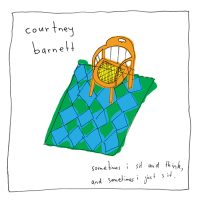
“sometimes I sit and think, and sometimes I just sit” (Milk Records/Mom+Pop Records)
By Eleni P. Austin
“Put me on a pedestal and I’ll only disappoint you, tell me I’m exceptional I promise to exploit you.” That caustic admonishment comes from Courtney Barnett on her first official long-player, “sometimes I sit and think, and sometimes I just think.” It’s a difficult warning to heed, as this album is pretty amazing.
Courtney Barnett grew up in Sydney, Australia in an artistic household. Her parents exposed her to Jazz and Classical music, but she and her brother were early converts to Rock & Roll. At age 10 she picked up a guitar and never looked back.
During her teens, Barnett was honing her chops in bands with names like Rapid Transit and Immigrant Union. Later, she attended Art School in Tasmania. When she completed her studies, she made ends meet by tending bar in Melbourne.
By 2012, Barnett had recorded her first EP, I’ve Got A Friend Called Emily Ferris, and released it through her own label, Milk! Records. A few months later, she followed with a second EP, How To Carve A Carrot Into A Rose.
Her sound was a potent combo of confessional singer-songwriter angst and Punky Garage Rock. Her droll lyrics and deadpan delivery garnered comparisons to Liz Phair, Bob Dylan and Lou Reed.
The buzz carried across the Atlantic and Barnett was invited to perform at the prestigious College Music Journal (CMJ), showcase in New York. On the West Coast, tastemaker public radio station KCRW, (particularly DJ Gary Calamar), put her music in heavy rotation.
In 2014, venerated indie label Mom+Pop Records signed her to an American deal and released her two Eps together as The Double EP: A Sea Of Split Peas. Her sardonic “Avant Gardner” song, (a dry retelling of an allergy attack that necessitated an ambulance ride), became a breakout hit. By the end of the summer Barnett was headlining at Pappy & Harriets.
Now Barnett is back with her first full-length album. In interviews she insists this is her real debut. “sometimes..” opens with the one-two punch of “Elevator Operator” and “Pedestrian At Best.”
“Elevator” is a tale of Oliver Paul, a corporate cog experiencing a career crisis. Rather than spend another day staring at a computer in a cubicle, he “rips off his tie, hands it to a homeless man sleeping in the corner of the metro bus stand/He screams I’m not going to work today!”
Over a stompy backbeat and guttural guitars, a comedy of errors ensues. He winds up sharing an elevator with an aging fashionista who “looks him up and down with her botox frown.” She mistakenly assumes he’s headed to the top of the building to jump, but he reassures her he’s just looking for some peace and quiet and confides, “all I ever wanted to be was an elevator operator, can you help me please?”
As though someone has flipped the radio dial, “Pedestrian At Best”comes blasting out of the speakers before the final notes of “Elevator…” recede. Skronky feedback guitars collide with stripped-down bass fills and a jackhammer beat. The lyrics offer a self-deprecating diatribe. “Erroneous, harmonious, I’m hardly sanctimonious…/I suppose we all outgrow ourselves, I’m a fake, I’m a phony, I’m awake, I’m alone, I’m homely, I’m a Scorpio.” Rollicking and ramshackle at the same time, it’s a Kangaroo-kissin’ cousin to Bob Dylan’s epochal “Subterranean Homesick Blues.”
Four songs offer the sort of intense introspection that borders on omphaloskepsis. This sort of navel gazing would feel super self-indulgent if Barnett wasn’t so goddamn funny.
Coming on the heels of the raucous “Pedestrian At Best,” “An Illustration Of Loneliness (Sleepless In New York)” feels sleepy and soporific, but that’s the point. Flayed, sand-blasted guitar riffs, rumbling bass lines and a see-saw rhythm underscore the profound “Lost In Translation” style disconnect. Barnett is alone and bereft in a hotel on tour, missing her girlfriend. “I’m thinking of you too, wondering what you’re doing, what you’re listening to, which quarter of the moon you’re viewing from your bedroom.” A reptilian guitar solo snakes through the melody, rattling this tale of extreme ennui.
The loping “Depreston” is powered by jangly, tilt-a-whirl guitars and a wistful mellotron wash. The lyrics recount a house-hunting expedition that becomes slightly depressing when it’s revealed that the former owners died in the house. Suddenly Barnett feels like a voyeur. “I see the hand-rail in the shower, a collection of those canisters for coffee, tea and flour and a photo of a young man in a van in Vietnam/Suddenly I can’t think of floorboards anymore.”
Slippery guitars and pile-driving beat (that echoes the Pretenders’ “Mystery Achievement”) anchor “Dead Fox.” Squally shards of guitar feedback punctuate this stream-of-conscious rant that touches on the benefits of organic produce, discourteous truck drivers and a road trip gone awry.
Finally, “Debbie Downer,” splits the difference between bouncy ‘80s Synth Pop and swirly ‘60s Psychedelia. Fueled by kaleidoscopic Farfisa organ fills and a bang-shang-a-lang beat, Barnett insists she has the floor; “Don’t stop listening, I’m not finished yet/I’m not fishing for your compliments.”
Anyone doubtful of Barnett’s protean talents should probably skip directly to the album’s most challenging songs, “Small Poppies” and “Kim’s Caravan, to confirm her precocity.
On the former, the guitars weave a weepy tapestry that conjures up Mexican Norteno, Hawaiian Slack Key, classic Country Western, and a hint of Santo & Johnny’s “Sleepwalk.” What begins as an offhand observation on lawn care morphs into a urgent mea culpa. “I don’t know quite who I am but I’m trying/I make mistakes until I get it right.”
The latter begins tentatively, the instrumentation is initially bare bones. Like the Doors’ “The End,” this is a dirge of epic proportions. The mood and tempo build slowly, guitars are cyclonic and slashing, discordant and difficult. The lyrics offer this philosophical nugget; “We either think that we’re invincible or that we are invisible, when realistically we’re somewhere between/We all think that we are nobody, but everybody is somebody else’s somebody…don’t ask me what I really mean, I am a reflection of what you really want to see, so take what you want from me.” Haunting and cathartic!
Other interesting tracks include the hooky, Punk-tastic pleasure of “Aqua Profunda.” The song is accented by rubbery bass lines, a tick-tock beat and plinky guitar licks that ping pong through a buoyant melody. Barnett gets coy and flirty, showcasing her limited athletic prowess at the public pool.
Jagged chunks of feedback propel “Nobody Really Cares If You Don’t Go To The Party.” Here, she’s arch, dismissive and vaguely indecisive as she confesses “I want to go out, but I want to stay home.”
The album closes with the slightly dour “Boxing Day Blues.” Swooping acoustic arpeggios accentuate a scene that’s brittle and bittersweet; a surprisingly diffident end to an album overflowing with self-assurance.
Courtney Barnett’s sharp songs are ably supported by Dan Luscombe on guitar, Dave Muddie on drums and Bones Sloane on bass and backing vocals. Their subtle rapport recalls the quiet-loud dynamic pioneered Neil Young’s long-time compadres, Crazy Horse.
“sometimes I sit and think, sometimes I just sit,” is equal parts effervescent and laconic. Barnett deftly side-steps the curse of the sophomore slump with an album rich in detail. No doubt this record will be at the top of critics’ polls at the end of 2015.
At one point, Courtney Barnett exclaims “Oh! the humanity, I wanna disappear into obscurity.” Too late for that now.













































